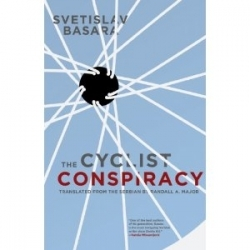The Cyclist Conspiracy
Svetislav Basara’s The Cyclist Conspiracy is a fascinating novel. Beginning with a first-person narrative by Charles the Hideous, ending with a design for an inverted Tower of Babel, and filled with mind-bending philosophical, psychological, and conspiracy theories, Basara manages to weave a tale that both confounds and delights.
The Evangelical Bicyclists of the Rose Cross is a society so covert that even some of its members are unaware of their membership. This “Brotherhood” meets in dreams; their purpose is to influence and change historical events from the future. One of many such events is the assassination of the Archduke Ferdinand.
Early in the story, a shipwrecked sailor on the island of Thulae, Captain Queensdale, encounters a “strange community” comprised of believers of ancient teachings that arose “at the very beginning of the acts of Christ’s apostles. They undertook the construction of a Mechanical Bird which they intended to use to rise into the seventh heaven.” Thus was born the Brotherhood and its bicycle, a vehicle for the transcendental connection to the divine.
The leader of this group, Joseph, tells Queensdale, “Now, get some rest, and when you gather your strength go see everything and ask questions about it all. Then take up the pen. From tonight onward, I will teach you every night in your dreams, and you will come to believe it because you already do.” The captain writes his story, seals it in a glass bottle, and releases it “into the fluctuating world of history.” Queensdale’s writings eventually become a book, the copies of which are ultimately found by those who “need” it.
Basara continues the tale by explaining the hidden meanings behind the shapes that comprise the bicycle, calling into question the theory of time, exposing letters written by Sigmund Freud, and mentioning a forgotten Sherlock Holmes story in which a cyclist
terrorizes London by riding around and
shooting out clocks.
The Cyclist Conspiracy questions the events of modern history, the lessons gleaned from them, and our perception of time and its corresponding effects on our interpretation of reality. This novel is not for those merely in search of “a good read.” Rather, Conspiracy is for the reader who wants a challenge and welcomes exposure to intellectual fiction at its best.
Reviewed by
Chris Fisher
Disclosure: This article is not an endorsement, but a review. The publisher of this book provided free copies of the book to have their book reviewed by a professional reviewer. No fee was paid by the publisher for this review. Foreword Reviews only recommends books that we love. Foreword Magazine, Inc. is disclosing this in accordance with the Federal Trade Commission’s 16 CFR, Part 255.

